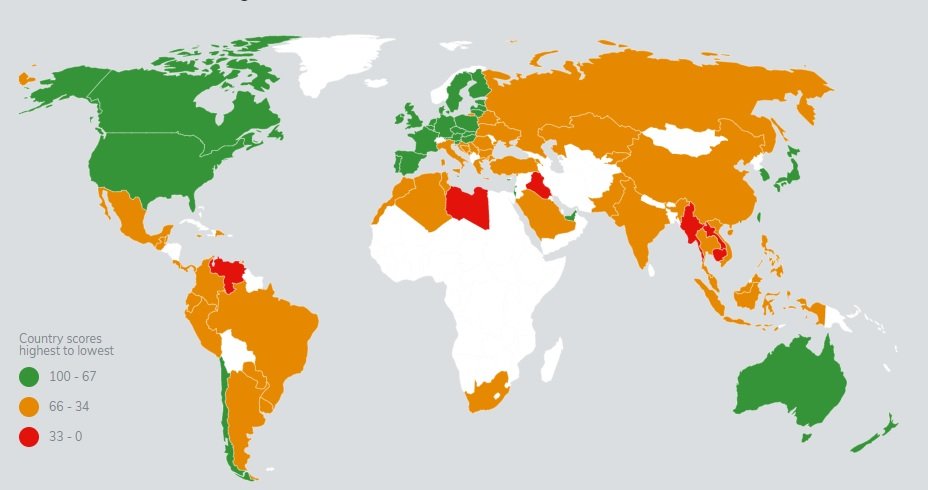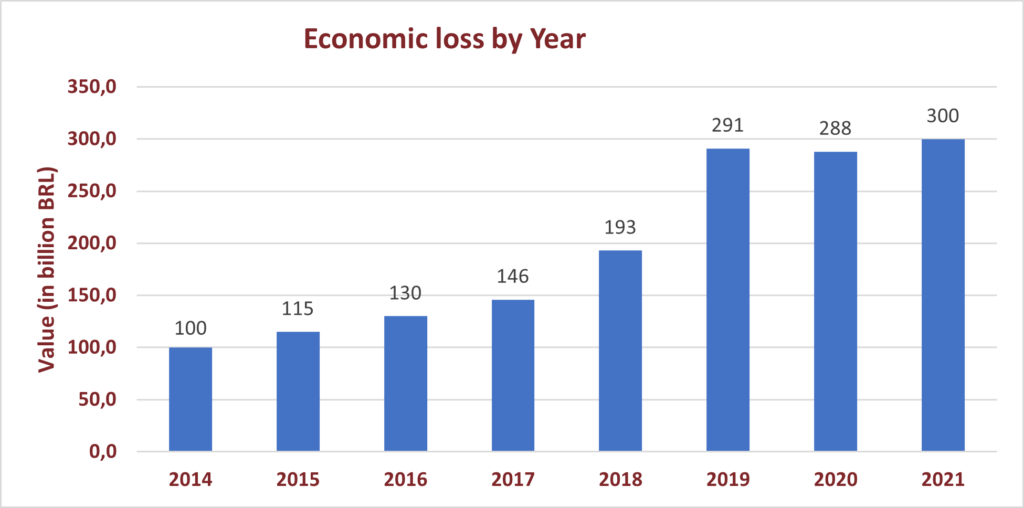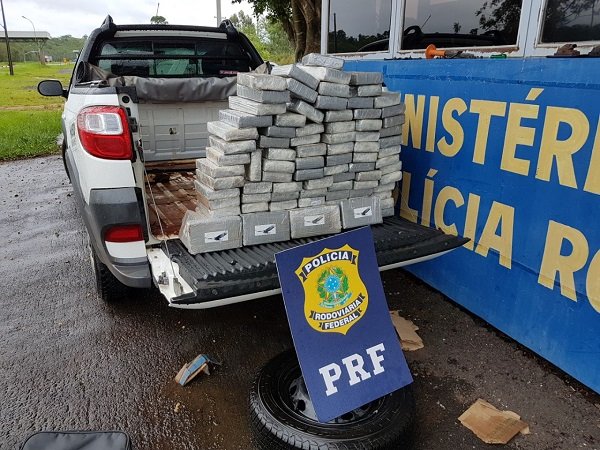In this month’s issue, we release the first of a two parts series that focus on the illegal activities in Brazil. We begin presenting the most relevant illegal practices, followed by a global index that shows the country’s position in relation to its peers. Finally, we discuss some of the consequences of the illegalities.
Next month, we will we delve into the relationship between illegal activities, organized crime and terrorism, and debate the proposals that experts and institutions have designed to fight such a problem.
THE ILLEGAL ACTIVITIES
Illegal activities generated a R$ 336.8 billion loss to the Brazilian economy in 2021. The value is equivalent to the GDP of the states of Bahia and Sergipe added together. In addition, the country lost the opportunity to generate 535,700 jobs.
The data was provided by the report “Illegal Brazil in Numbers”, a survey promoted with the support of the Associação Comercial RJ (ACRJ), the Federação do Comércio de Bens, Serviços e Turismo do Estado do Rio de Janeiro (Fecomércio-RJ) and the Federação das Indústrias do Rio de Janeiro (Firjan). The study was released during the seminar “Fight Against Illegal Brazil”, which took place in Rio, on 4 August 2022.
The damage to the economy highlighted in the study has been caused by a series of criminal activities. Smuggling and piracy are two of these illegal practices and some of the most harmful to society. Among the most affected products, cigarettes are a notoriously pirated and smuggled. In the first semester of 2021, 7 million cigarette packs were seized by the Brazilian Federal Revenue (RFB). The illegal product is so widespread that it accounted for 57% of the national market in 2019 The brands smuggled, mostly from Paraguay – Eight, Gift, Palermo, Club One –, are so strong in the market that it has become advantageous for gangs to counterfeit them locally. In 2019, authorities found and closed 9 clandestine factories, which produced 5.3 billion cigarettes in the countryside of São Paulo, Rio Grande do Sul and Minas Gerais.
The popularly known “cat”, which is an illegal connection to obtain a service, such as water or energy, without paying for it, is quite common practice across Brazil. But contrary to the popular belief, it is a crime committed by poor and rich alike, and even by commercial facilities. In 2017, Rio’s energy provider, Light, revealed that more than half of energy thefts in the area in which it operates are concentrated in classes A, B and C. According to the company, about of 10 million consumers, 52% of all energy loss is from middle and upper-class regions. The remaining 48% are concentrated in favelas. In 2018, the Agência Nacional de Energia Elétrica (Aneel) revealed that from May 2017 to April 2018, Brazil lost enough energy to supply Santa Catarina state for an entire year. The cost would reach approximately R$ 4.5 billion. If there were no thefts, tariffs could be 4.3% cheaper.
Tax evasion is another illegal activity among those that hurt the economy. In Brazil, one of the sectors deeply affected by this anti-competitive practice is that of fuels. According to Antonio Ferreira Martins, chairman of the Instituto Combustivel Legal (ICL), which had been created to fight frauds in the sector, a large part of the illicit actions of companies that import, distribute and resale fuels involve illegal maneuvers to evade the payment of taxes, especially ICMS and PIS/ COFINS, which are quite high. The list of tactics includes clandestine sales, without invoice; fictitious interstate operations to pay less ICMS; adulteration in the composition of fuels with the illicit use of products with lower taxation; and the persistent tax default.
Even though quite new when compared to other criminal activities, online piracy has won ground quite fast. Cybersecurity company Akamai has published its latest report on piracy consumption “Pirates in Sight”. In collaboration with the anti-piracy company MUSO, the study analyzed online and media piracy in 15 countries. According to this work, Brazil is the fifth country in the global ranking of access to pirated content. From January to September 2021, Brazil reached the milestone of 4.5 billion unlicensed streams and downloads. These numbers are measured by visits to web pages that offer access to movies and television shows, via a browser or mobile app, in addition to torrent downloads.
Meanwhile, one of the oldest types of crimes that hampers the economy, cargo robbery continues without solution and had its first growth recorded since 2017. A recent study by NTC&Logística points out that this practice increased by 1.7% in 2021. There were 14,400 incidents reported, of which the vast majority took place in the Southeast (82.66%), in Rio de Janeiro (31.32%) and in São Paulo (45.23%). The total loss due to this type of crime was R$ 1.270 billion. The most targeted products were food, fuel, pharmaceuticals, auto parts, materials from the textile and apparel sector, cigarettes, electronics, beverages, and pesticides.
GLOBAL INDEX
The context described above is responsible for the low score that Brazil has presented in the The Global Illicit Trade Environment Index. In 2018, the country accumulated a score of 50.6, ranking in the 59th global position. In South America it came ahead only of Venezuela (28.1/80th), Paraguay (43.3/70th), and Ecuador (50.1/60th).

THE DAMAGE TO SOCIETY: FINANCIAL IMPACT AND MORE
The consequences of the illicit practices in Brazil are extensive and complex to measure. However, one of the ways researchers have done this is by calculating its financial impact. According to “Illegal Brazil in Numbers”, in 2021, the total loss for the country was R$ 336.8 billion. The financial loss is a reflex of merchandise that were traded illegally, causing direct damage to the private sector; taxes that were not collected; and theft of energy and water. Most of the loss calculated by the study is due to taxes lost (R$ 95 billion) and the impact on 16 economic sectors (R$ 215 billion), which are presented on the chart below.

A few other institutions concerned with the same problem have also promoted studies to calculate results of the illegal activities in Brazil. Among them, the Fórum Nacional Contra a Pirataria e a Ilegalidade (FNCP) stands out. The FNCP carried out surveys for several years, accumulating data for a long period. However, as parameters are different from that of the first survey mentioned, the monetary impact is a bit different for 2021. The FNCP evaluated only 15 sectors in the economy. On the other hand, the calculated loss for the sectors that appear in both studies are the same or quite close.
As the FNCP brings data records for a few years, it is possible to verify that the financial loss has been growing:

Despite the methodological differences, the FNCP and “Brasil Ilegal” reveal a substantial impact caused by taxes not collected. Without paying tributes and without meeting Brazilian industry standards, smuggled products, for example, unbalance the national market by creating an unfair competition with what is produced and sold by the formal market, harming job creation and investments in education, culture, public safety, and the economic development. In this sense, the cigarette illegal trade is a good case. In 2019, as already mentioned, it occupied most of the market and led to a loss of R$15.9 billion in taxes, preventing the creation of 173,000 new jobs, according to Oxford Economics and the FNCP.
Investigations have shown that the illegal economic practices are also associated to many other crimes of different nature, like human trafficking, slave work, and the corruption of minors. Gangs of counterfeiters normally help to smuggle people into Brazil, where they serve as workforce in clandestine factories. Sometimes, these workers are deceived and end-up becoming slaves in a foreign country. Besides that, among gang members, it is not rare to find minors who dropped out of school after being enticed by the good profits of the illegal market.
Risks to the environment and health are another relevant issue. As this industry operates outside the law, safety and sanitary production standards are totally ignored. Some of the biggest dangers are the contamination of the locations where the counterfeit item is made and the effect that it has on the health of the people who use it. Toys made in this condition can intoxicate or injury kids; and smuggled pesticides used in plantations across the country can have innumerous consequences – cancer, tumors etc. – to those that have contact with crops, from producers to consumers.
Another source of hazards to health are fake medicines. In Brazil, the most counterfeit drugs are the most sought after, especially for erectile dysfunction and others such as anabolic steroids, slimming drugs and for the treatment of cancer. During the pandemic, even fake vaccines appeared and were sold online. In this example, the improper disposal of millions of vaccine vials helped criminals, just like in the case of fake whiskey and perfumes.




